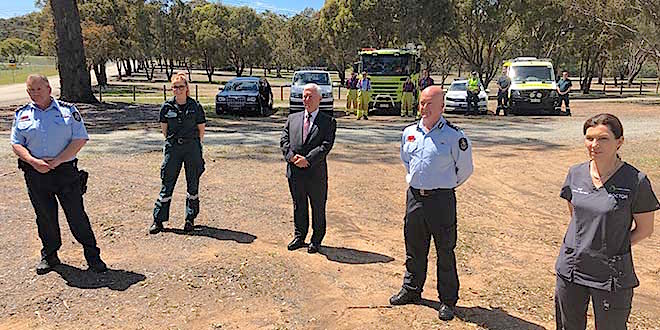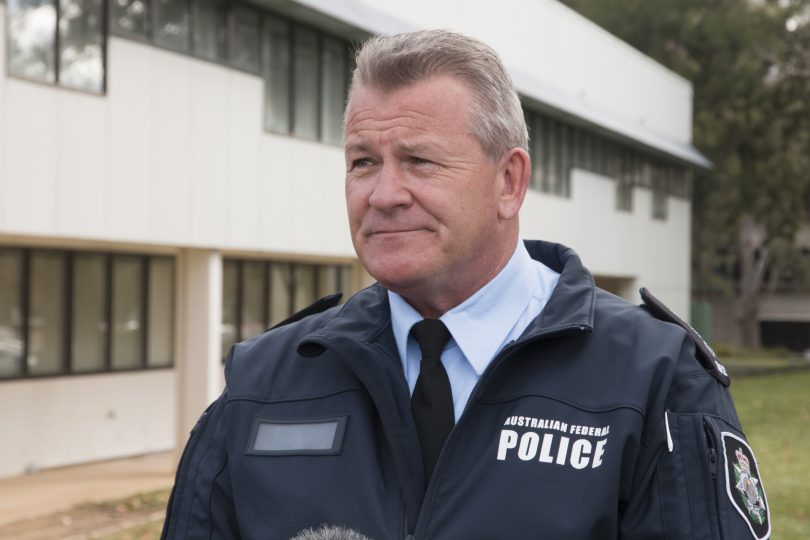
Detective Inspector Marcus Boorman (left), William Cole (centre) and Dr Ailene Fitzgerald (right) with representatives from ACT Ambulance Service and ACT Fire and Rescue at the launch of the road safety campaign. Photo: Supplied.
Students at Melrose High School are being provided grief counselling and support following the death of a 16-year-old girl in a car accident that occurred last weekend.
In a letter sent to parents and carers this week, the school offered support services including a school psychologist and other members of the student wellbeing and support team.
“Over the weekend an accident occurred impacting members of the Melrose community. We appreciate that this incident has been distressing for a number of our students and our broader community,” the letter read.
“We encourage members of our community to reach out and talk to each other and support those around you. Look out for signs that your children might be struggling with what has happened.”
An ACT Policing spokesperson said the ACT Policing’s Major Collision Team is continuing to investigate the circumstances surrounding the incident and a report will be prepared for the coroner.
The 16-year-old girl was the front seat passenger in a Nissan Navara which hit a tree on Longmore Crescent in Wanniassa at about 1:50 am on Saturday, 31 October.
The girl was transferred to hospital with life-threatening injuries and died on Tuesday (3 November).
The girl’s death was the sixth road death in the ACT this year and came as police and emergency services launched a new road safety campaign to combat high range speeding offences that have occurred since the COVID-19 restrictions were enforced in March.

Marcus Boorman said speeding on our roads is “unacceptable”. Photo: Dominic Giannini.
The ACT’s head of road policing, Detective Inspector Marcus Boorman, said police had issued 3007 speeding fines since March and drivers were “treating the empty roads like their personal racetrack”.
“It’s completely unacceptable and as we now move toward that Christmas holiday period, we will be putting as much police resources as we can out there to address this problem,” Det Insp Boorman said.
“Police have to examine horrific crash sites, firefighters have to cut people out of mangled vehicle wrecks, ambulance officers have to treat injuries at the scene, and surgeons have to treat them in hospital.
“And if the worst-case scenario does happen, funeral directors are then called in to deal with dead bodies following collisions.”
Bill Cole of William Cole Funerals has been a funeral director for 33 years and also attends numerous motor vehicle accident sites, which he described as “the most confronting of all”.
“We get there after the first responders have finished what they need to do, the scene has been cleared – there’s almost an eerie quietness about it.
“We’re known to some as the ‘last responders’,” he said.
“We deal with families making decisions they don’t want to make and when you look back on why we’ve been there it’s [often] because of something that could have been avoided has happened – a little bit too fast, a little bit too much to drink, maybe a drug, maybe a combination of these things.”
Dr Aileen Fitzgerald is a trauma surgeon and director with Canberra Health Services who also sees the results of motor vehicle accidents first-hand.
“We hear about the road toll and we think of the families that are left behind,” Dr Fitzgerald said.
“One of the things we often don’t hear so much about … is the number of families that have had their lives changed forever because of disability and injury.
“So you might not lose your life but equally you might have a loved one have to care for you forever, and that’s life-changing. That’s equally as devastating.”
Det Insp Boorman said the five highest factors that contribute to fatal vehicle collisions on ACT roads are alcohol or drug-impaired driving, speeding, not wearing a seatbelt, intersections and driving while distracted.
“This is why we’re asking drivers to consider ‘who are you rushing to meet?’ because if you speed, if you drive under the influence of drugs or alcohol you could be arriving at a very different destination than you initially anticipated,” he said.
Police ask drivers ‘who are you rushing to meet?’
ACT Policing is asking drivers to consider ‘who are you rushing to meet?’ as this month’s traffic focus turns to the Fatal Five.The five highest contributing factors to fatal vehicle collisions on ACT roads are:- Alcohol or drug impaired driving- Speeding- Not wearing a seatbelt- Intersections- Driver distraction When you exhibit these driving behaviours, you run the risk of meeting a different five, being police, fire brigade, ambulance officers, trauma surgeons, or even a funeral director. You could be arriving at a very different destination than you initially anticipated.
Posted by ACT Policing on Tuesday, November 3, 2020












